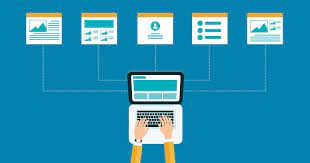Hello!
Navigating the vast sea of data generated every day can be overwhelming, but it’s becoming an integral part of the hospitality industry.
In the world of hotels, Big Data is revolutionizing the way we understand and target customers, boost returns on advertising campaigns, and make informed strategic decisions.
 But, how exactly can you leverage this powerful resource for effective marketing? This article provides a comprehensive guide to help you harness the transformative power of Big Data analytics in your hotel marketing strategies.
But, how exactly can you leverage this powerful resource for effective marketing? This article provides a comprehensive guide to help you harness the transformative power of Big Data analytics in your hotel marketing strategies.
So, sit back, and let’s dive right in!
What is Big Data Analytics?
In an increasingly digital world, we generate a massive amount of data every day. This enormous and complex dataset, referred to as Big Data, can provide powerful insights when analyzed effectively.
Big Data analytics involves using various tools and techniques to process this data and extract meaningful insights.
It combines structured data from sources such as customer databases with unstructured data, like social media posts, to give businesses a well-rounded understanding of their performance and market dynamics.
Types of Big Data Analytics and Their Uses
 Now that we’ve covered what Big Data analytics is, let’s delve into the different types and how they can contribute to your business. We’ll be looking at three main types – descriptive, predictive, and prescriptive analytics.
Now that we’ve covered what Big Data analytics is, let’s delve into the different types and how they can contribute to your business. We’ll be looking at three main types – descriptive, predictive, and prescriptive analytics.
Descriptive Analytics
Descriptive analytics is the most basic form of analytics. It involves the aggregation and mining of historical data to uncover trends and patterns that occurred in the past.
This process helps you comprehend the reality of what has already happened in your business.
For example, descriptive analytics in the hospitality industry could involve analyzing metrics such as average occupancy rates, revenue per available room, or guest demographics from past years.
This information gives you a clear picture of your hotel’s past performance and allows you to understand which initiatives worked well and which didn’t.
 Moreover, it can also provide information about customer behavior.
Moreover, it can also provide information about customer behavior.
By analyzing patterns and trends in bookings, cancellations, and spending, you can identify peaks and troughs in demand and adapt your digital marketing strategiesaccordingly.
Predictive Analytics
Predictive analytics leverages statistical techniques and machine learning algorithms to interpret historical data, identify patterns, and make informed predictions about the future. It allows you to move from understanding what has happened to anticipating what is likely to happen.
In a hotel context, predictive analytics might be used to forecast occupancy rates or revenue for the next quarter based on past trends. It can also predict customer behavior.
 For example, using customer data from previous stays, you can anticipate what amenities a returning guest may prefer or predict when they are likely to book their next stay.
For example, using customer data from previous stays, you can anticipate what amenities a returning guest may prefer or predict when they are likely to book their next stay.
Such predictions can drive targeted marketing campaigns, personalized offers, and enhanced guest experiences, giving you a significant competitive advantage.
Prescriptive Analytics:
Prescriptive analytics is the pinnacle of data analytics. It uses complex algorithms and computational models to recommend the optimal course of action, given a specific scenario or objective. It’s like having your own personal data-driven advisor.
For instance, if predictive analytics forecasts a dip in demand during a particular period, prescriptive analytics could suggest strategies to boost bookings.
These might include running a promotional campaign, adjusting room rates, or offering additional services to attract guests.
 Similarly, if there’s a predicted increase in demand, it might recommend measures to ensure optimal resource allocation to handle the surge and enhance customer satisfaction.
Similarly, if there’s a predicted increase in demand, it might recommend measures to ensure optimal resource allocation to handle the surge and enhance customer satisfaction.
Moreover, using prescriptive analytics hotel rate shoppers allow hoteliers to dynamically adjust prices.
Incorporating data analytics in these tools helps hotel businesses predict fluctuations in demand based on past data, competitor rates, and market trends which enables optimized pricing decisions and maximized revenue.
Big Data and Customer Success: A Winning Combo
Big data is not just about making sense of numbers. It’s about understanding customers, their behaviors, and their needs.
By leveraging big data, customer success teams can identify patterns and trends in customer behavior that may have previously gone unnoticed.
This ability to anticipate and respond to customer needs quickly can significantly improve customer satisfaction and contribute to the overall success of your hotel.
Implementing Big Data Analytics in Your Organization
 Integrating big data analytics into your organization might seem like an intimidating task, but it’s a strategic investment that can result in substantial returns.
Integrating big data analytics into your organization might seem like an intimidating task, but it’s a strategic investment that can result in substantial returns.
If you’re not sure where to start, here’s a comprehensive step-by-step guide to lead you through the process:
Step 1: Identify Your Goals and Define Your Key Objectives
Before you start implementing big data analytics, it’s important to identify what you hope to achieve from it.
Your goals might be related to understanding your customer behavior better, and identifying market trends, enhancing operational efficiency, or improving revenue management.
Establishing these goals early on will provide a clear direction for your big data strategy.
For instance, if your primary objective is to improve customer satisfaction, your focus could be on analyzing customer feedback and behavior to personalize experiences.
On the other hand, if your goal is to enhance revenue management, you could use predictive analytics to forecast demand and optimize pricing.
Step 2: Invest in the Appropriate Tools and Infrastructure
 Once you’ve identified your goals, you’ll need to invest in the right tools and infrastructure to handle big data.
Once you’ve identified your goals, you’ll need to invest in the right tools and infrastructure to handle big data.
This involves selecting suitable hardware and software to store, process, and analyze large volumes of data efficiently.
There is an array of big data tools available in the market, ranging from data management and storage tools, like Hadoop and NoSQL databases, to analytics tools, like Apache Spark or Google BigQuery.
Each tool has its strengths and is suited to different types of tasks, so it’s crucial to choose the ones that align best with your objectives and budget.
Additionally, it’s important to ensure your existing IT infrastructure can support these tools. Depending on your requirements and resources, you might opt for on-premise, cloud-based, or hybrid infrastructure.
Step 3: Train Your Team or Hire Data Specialists
 Big data analytics requires specialized skills. Your team needs to be proficient in data management, statistical analysis, and machine learning, among other areas. They should also understand the specific requirements of the hospitality industry.
Big data analytics requires specialized skills. Your team needs to be proficient in data management, statistical analysis, and machine learning, among other areas. They should also understand the specific requirements of the hospitality industry.
If your team lacks these skills, consider investing in training to help them develop the necessary expertise. This could involve workshops, online courses, or on-the-job training.
Alternatively, you might want to hire data specialists or partner with a data analytics company. This can provide you with instant access to the necessary skills and allow your team to focus on their core tasks.
Step 4: Start Small and Gradually Scale Up Your Efforts
Implementing big data analytics doesn’t have to be an all-or-nothing endeavor.
Starting with a smaller project or a specific area of your business can help you test your strategy, tools, and skills without risking too much.
 For example, you might start by analyzing customer reviews to understand guest preferences and feedback.
For example, you might start by analyzing customer reviews to understand guest preferences and feedback.
Once you’re comfortable with this and see positive results, you could expand to other areas, such as demand forecasting or dynamic pricing.
How To Measure The Impact Of Data Analytics
When you want to comprehend the genuine influence of big data analytics on your hotel’s marketing strategies, it’s crucial to have a system of measurement in place.
To do this effectively, you need to identify and monitor some key performance indicators (KPIs). Below, we unpack these KPIs to make this task more manageable and straightforward:
1. Response Times
Your response time is a critical indicator of your customer service quality. This KPI measures how quickly your team responds to customer queries or complaints.
With the help of big data analytics, you can analyze response times in detail, finding patterns and pinpointing areas for improvement. A decrease in response times typically indicates improved efficiency.
2. Problem Resolution Rates
 The problem resolution rate measures how effectively and efficiently your team handles customer issues. It’s not just about speed, but also about ensuring the problem is fully resolved to the customer’s satisfaction.
The problem resolution rate measures how effectively and efficiently your team handles customer issues. It’s not just about speed, but also about ensuring the problem is fully resolved to the customer’s satisfaction.
With analytics, you can track these rates over time, identify common issues that require improved processes, and even predict future challenges based on past trends.
3. Conversion Rates
Conversion rate, a pivotal marketing KPI, denotes the percentage of customers who act – such as making a booking – post viewing your promotional content. With the power of big data analytics, it becomes possible to decipher what sways a customer’s booking decision.
This not only enables content optimizationbut also refines your marketing messages to bolster conversion rates.
4. Customer Satisfaction Levels
Customer satisfaction is perhaps the most important KPI. It indicates how happy your customers are with their overall experience at your hotel.
 Using big data analytics with CRM software helps you dive deeper into customer feedback and ratings to understand what you’re doing right and where you need to improve.
Using big data analytics with CRM software helps you dive deeper into customer feedback and ratings to understand what you’re doing right and where you need to improve.
Remember, the goal of tracking these KPIs is to provide actionable insights that can shape your marketing strategies. By consistently monitoring and analyzing these metrics, you can determine the efficacy of your big data initiatives and make adjustments as needed.
It’s a continuous process of learning, adapting, and enhancing to stay ahead in the competitive hotel industry.
Also read:
- 10 Best Data Science Jobs
- 5 Hidden Benefits of Business Process Outsourcing
- Optimizing SEO for Cleaning Services and Companies
Conclusion:
 Big Data is not just a trend. It’s here to stay, and it’s reshaping the way hotels approach marketing. By understanding and leveraging big data analytics, hotels can gain a competitive edge, deliver superior customer experiences, and drive significant growth.
Big Data is not just a trend. It’s here to stay, and it’s reshaping the way hotels approach marketing. By understanding and leveraging big data analytics, hotels can gain a competitive edge, deliver superior customer experiences, and drive significant growth.
The journey toward implementing big data analytics in your organization may seem challenging, but the rewards are well worth the effort. So get ready to embark on this transformative journey.
Thank you!
Join us on social media!
See you!






